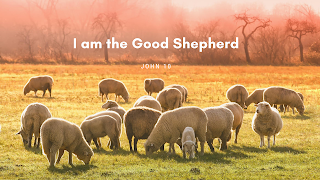ARE YOU A GOOD SHEPHERD OR A BAD SHEPHERD?
Reflection for the Fourth Sunday of Easter, Year B
Fr. Ugochukwu Ugwoke, ISch
Readings: Acts 4:8-12, 1 John 3:1-2, John
10:11-18)
Today
is the Fourth Sunday of Easter and the liturgy of every Fourth Sunday of Easter
in the year (A,B,C) presents us with the theme of the “Good Shepherd.” Already
in the Old Testament, God had been portrayed as the ideal shepherd in contrast
to the avaricious leaders of Israel (Isaiah 40:11, Ezekiel 34:1-22). In Jesus, this prophetic
promise of God to become the true shepherd of his people has been realized. Jesus
is the ideal Good Shepherd and a greater part of the tenth chapter of the gospel
according to John is dedicated to this discourse about Jesus as the Good
Shepherd (John 10:1-18).
In
today’s gospel reading, Jesus as the model shepherd presents to us the
qualities of a good shepherd. The first thing that distinguishes a good shepherd
from a bad one is that a good shepherd is self-sacrificing and altruistic. The good
shepherd lays down his life for the sheep (John 10:11). Jesus exemplified this
when he laid down his life for us. He died that we might live. However, we are
living in a time when shepherds take advantage of their own sheep and some even kill their own sheep in order to safeguard
themselves. As modern-day shepherds (parents, religious and circular leaders), this
first quality of a good shepherd challenges us to learn to make sacrifices for the
sheep entrusted to our watchful care.
Also,
a good shepherd is different from a hireling. While a hireling flees and
abandons the sheep when he sees the wolves coming, a good shepherd never leaves
the sheep in the face of danger. A good shepherd stakes his life in defense of
the sheep (John 10:12-13). This is the quality that Peter portrayed in the
first reading. As the visible head of the apostles, Peter was always courageous
in defending the cause of the Christian faith (Acts 4:8-12). Peter suffered greatly
for the name of Christ and courageously faced many wolves (the Chief Priests,
Scribes and the Pharisees) in defense of the faith. In a time when we have
shepherds who prey on their sheep like wolves, we are reminded once again that a
good shepherd has the duty to protect and defend the sheep in the face of
danger. Our politicians who remember us only when they need our votes only to abandon
us to hunger and suffering once they get hold of power are clear examples of
hirelings. Like politicians, hirelings are opportunists.
As the Church celebrates the World Day of prayer for Vocations today, we are reminded that each one of us is a shepherd in our different states in life or vocations. In the family, the parents are shepherds to every member of the family including the domestic workers (maids). The religious and the political leaders are also shepherds in their own ranks. As shepherds therefore, we are to imitate the examples of Christ the Good Shepherd. In the discharge of your duties as shepherds, what category of a shepherd are you- a good or a bad one? It is only a bad herder that will use his herds to destroy the means of livelihood of others. A good shepherd does not inflict pains on others.
Lastly, Jesus is our shepherd. He knows us in the same way as the Father knows him and he knows the Father. As the sheep of his flock, let us always heed his voice and the voice of other good shepherds under whose protecting care, we rest. The sheep know the shepherd and also heed the voice of the shepherd. If the followers do not heed the voice of the leaders, leadership will surely be difficult. Know who you follow. Do not follow a shepherd that will lead you astray. Do not forget to pray for the shepherds. During his homily at the Mass of the inauguration of his Petrine ministry, Pope Emeritus, Benedict XVI asked the people to pray for him that he may not flee for fear of the wolves. Let us make these words our own whenever we pray for the shepherds. May God bless us all. Amen.



Amen!
ReplyDelete🙏🏽🙏🏽
DeleteAmen. Great message. Thank you Fr.
ReplyDeleteYou're always welcome, Abdul. God bless you.
Delete